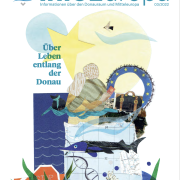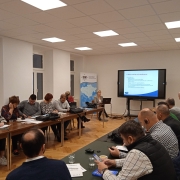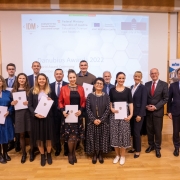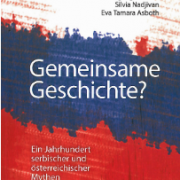Danubius Awards 2022
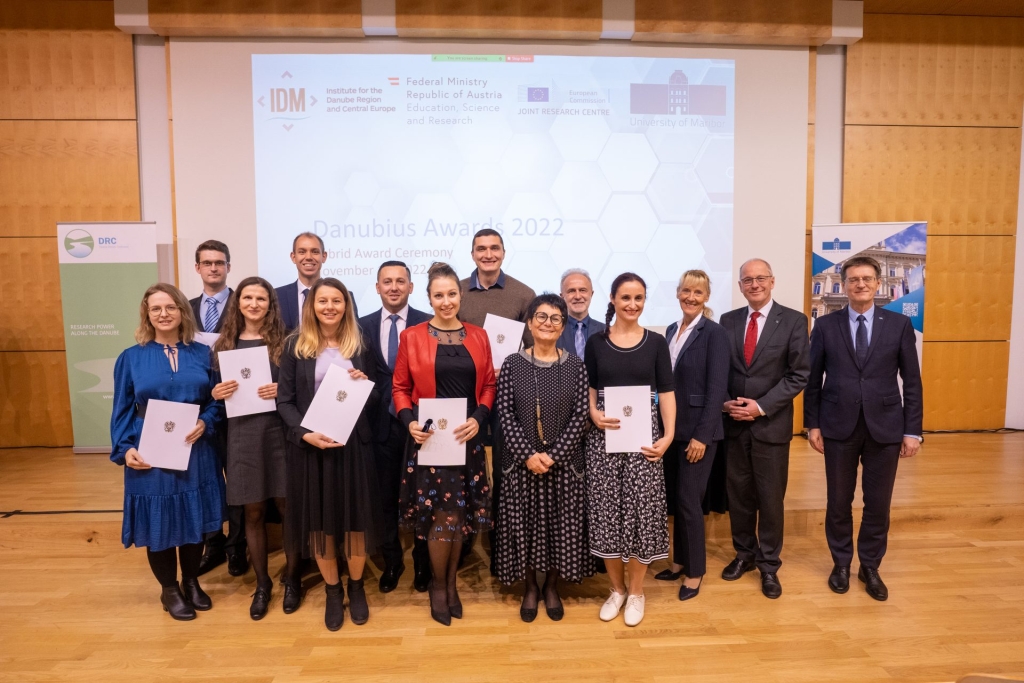
Danubius Award 2022 to the Bulgarian scientist Prof. Dr. Diana Mishkova, Danubius Mid-Career Award to Ukrainian scientist Assoc. Prof. Dr. Tamara Martsenyuk and Danubius Young Scientist Awards to 13 promising researchers from the Danube region.
The “Danubius Award” 2022 goes to Bulgarian Prof. Dr. Diana Mishkova, History Professor and Director of the Centre for Advanced Study (CAS) in Sofia, Bulgaria. With her work focusing on modern and contemporary history of Eastern Europe, the modernization of South-Eastern Europe, European societies, and European peripheries as well as national identities, she has contributed profoundly to research on the Balkans. She is o the funding director of CAS Sofia, that is supported by numerous international sponsors, such as the Wissenschaftkolleg Berlin (Institute for Advanced Study Berlin). Prof. Dr. Mishkova has already received several awards for her scientific work and is involved in different international projects – currently in the Horizon 2020 project “PREVEX – Preventing Violent Extremism in the Balkans”.
Ukrainian scientist Assoc. Prof. Dr. Tamara Martsenyuk has been awarded the “Danubius Mid-Career Award” 2022. She is an Associate Professor at the National University of Kyiv-Mohyla Academy. In her studies, she focuses on gender research, social inequality issues, gender policies, social movements, and empowerment. In addition to numerous stays abroad and the participation in international research projects, she also brings her expertise to national policy forums and NGOs. Her research is currently focusing on the topic “Women’s involvement in Russia’s War against Ukraine”.
In addition, 13 young scientists from the Danube Region will be awarded with the Danubius Young Scientist Award 2022 for their scientific work.
By presenting these Awards, the Austrian Ministry for Education, Science and Research (BMBWF) is contributing to the implementation of the EU Strategy for the Danube Region (EUSDR) adopted by the European Council in 2011. Through the awarding of outstanding scientific achievements, the Danube region is made visible as a research area and the perception of its multidisciplinary challenges and potentials is strengthened.
“The Danube Region provides many opportunities for cross-border and regional cooperation among universities as well as research organizations. And there are, indeed, plenty of common challenges along the Danube and beyond which we need to jointly address and develop solutions for“ Federal Minister for Education, Science and Research Prof. Martin Polaschek pointed out on the occasion of the award ceremony on 10 November 2022 at the University of Maribor.
“The role of scientists and researchers has changed profoundly in the last decade. On the one hand, scientists and researchers are in a high demand to deliver fast results and provide evidence for critical policy decisions, and they have become indispensable in explaining and communicating the current knowledge available. On the other hand, we see a worrying rise in skepticism towards science and research as well as towards democracy in general, which creates a wide range of problems for and in our societies. We need to work together to counter this skepticism, and I am confident that all of you present and especially the awardees of today can and will contribute with their work towards demonstrating and communicating the relevance of science and research“, Polaschek continued.
The award ceremony in Maribor took place in the presence of Barbara Weitgruber, Head of the Department from the BMBWF, and Friedrich Faulhammer, Chairman of the Institute for the Danube Region and Central Europe (IDM).
In her introduction, Barbara Weitgruber highlighted the solidarity with Ukraine as partner country of the EUSDR: “We will continue our support to the Ukrainian researchers, who have come or aim of coming in the EU, as well as to those remained in Ukraine. In addition to that, we hope for an early beginning of the reconstructions, and we are getting ready for appropriate support measures”.
Friedrich Faulhammer added: “I am really pleased that once again we are working together with the Ministry for Education, Science and Research to honor scientists, who are significantly contributing to the development of knowledge and understanding within the Danube region in their various fields of research. This year, I am particularly pleased that we can also highlight the scientific work of Ukrainian female researchers, as they are currently forced to work under the conditions caused by the unjustified Russian attack on their country”.
The “Danubius Award” was established in 2011 to honor researchers who have outstandingly dealt with the Danube Region in their academic or artistic work. The prize is granted every year on a rotating basis for achievements in the humanities, cultural and social sciences (2022) or in life sciences and is endowed with € 5,000.
The “Danubius Mid-Career Award” is endowed with € 2,200 and has been awarded since 2017 to researchers who are from 5 to a maximum of 15 years after their last formal scientific degree or have equivalent scientific experience. The prize winners were selected by an independent jury of experts chaired by Univ. Prof. Dr. Stefan M. Newerkla (University of Vienna).
Since 2014, special young talent awards, the “Danubius Young Scientist Awards” have also been awarded. The prize, which is open to all disciplines, highlights the scientific work and talent of young researchers and increases the visibility of the excellence of the research community in the Danube Region. In this way, the prizes also contribute to the fact that young scientists deal with the river and the region in a variety of ways. The young talent prizes are endowed with € 1.350, per award winner. The selection was made by an international jury of experts, whereby the candidates for the award were nominated by their respective scientific institutions.
| Austria | Daniela Apaydin |
| Bosnia and Herzegovina | Marko Djukanović |
| Croatia | Jelena Kranjec Orlović |
| Czech Republic | Adela Grimes |
| Germany | Jan Schmitt |
| Hungary | Blanka Bartos |
| Moldova | Nicolae Arnaut |
| Montenegro | Miloš Brajović |
| Romania | Mihaela Cudalbeanu |
| Serbia | Zorana Miletić |
| Slovakia | Tibor Zsigmond |
| Slovenia | Žane Temova Rakuša |
| Ukraine | Illia Diahovchenko |
Watch the Award ceremony below
Where the river flows, science follows
[/av_one_full]
Gemeinsame Geschichte? Österreichische und serbische Mythen von 1914 bis 2014
IDM-Projekt, gefördert durch den Zukunftsfonds der Republik Österreich
Projektziel:
Im inzwischen abgeschlossenen IDM-Forschungsprojekt werden all jene handlungsleitenden Mythen erfasst und analysiert, die über hundert Jahre das Verhältnis zwischen Wien und Belgrad bestimmt haben. Einander gegenübergestellt sind hier insbesondere der Habsburgermythos und der Kosovomythos, die beide je nach politischem Interesse instrumentalisiert wurden. Der Untersuchungszeitraum beginnt mit der Ermordung des austrophilen Königs Aleksandar Obrenović 1903, die ein zusehends konfrontatives Verhältnis beider Länder einleitete, und endet mit dem gegenwärtigen EU-Integrationsprozess Serbiens, für den sich Österreich explizit einsetzt. So wechseln sich zwischen 1903 und 2014 die Phasen von Kooperation und Konfrontation gegenseitig ab, was durch die hierfür instrumentalisierten Mythen verstärkt wird.
Das Verhältnis zwischen Österreich und Serbien ist nicht friktionsfrei. Darauf verweisen diverse Diskurse, die anlässlich des möglichen EU-Beitritts Serbiens hierzulande zu vernehmen sind. Viele dieser Diskurse fußen auf unbewiesenen Vorurteilen und Mythen, deren Ursprünge weit in die Vergangenheit zurückreichen. Auch in Serbien kursieren viele historische Mythen über Österreich, die der sozialen Wirklichkeit nicht entsprechen, jedoch gegenwärtige Wahrnehmungen beeinflussen. Im inzwischen abgeschlossenen Projekt geht es um eine aufklärerisch motivierte Aufarbeitung dieser von Propagandamythen verklärten hundert Jahre zwischen 1914 und 2014. Das biperspektivische Forschungsdesign sollte Erkenntnisse liefern, die ein differenziertes Geschichtsbild zu zeichnen erlauben und darüber hinaus auch eine zutiefst bedeutsame Funktion im Hinblick auf die europäische Integration, also auf die Einbindung der Balkanstaaten bzw. des „West-Balkans“ in die Europäische Union in der Zeit nach 2014 erfüllen. Das Projekt soll damit einen grundlegenden Beitrag zum gegenseitigen und ‚nachbarschaftlichen’ Verständnis im gegenwärtigen europäischen Integrationsprozess leisten. Ein differenziertes Geschichtsbild und gegenseitiges Verständnis sind nicht zuletzt im Kontext verstärkter politischer, wirtschaftlicher sowie kultureller Vernetzung und Zusammenarbeit zwischen EU-Mitgliedsländern und EU-Kandidatenländern wesentlich.
Mit dem Sarajevo-Attentat 1914 und der darauffolgenden Kriegserklärung Österreich-Ungarns an Serbien entwickeln sich der Habsburgermythos und Kosovomythos zu Hauptideologemen beider Staaten. Der Habsburgermythos soll mitsamt seinen Umdeutungen, bis zum Ende des Zweiten Weltkriegs seine politische Strahlkraft erhalten und im neutralen Österreich nur mehr im Kulturbereich fortwirken. Dagegen soll der mythologisierte gemeinsame Kampf gegen eine feindliche Fremdherrschaft (unausgesprochenes Merkmal des Kosovomythos) die Grundlage von Titos Partisanenbewegung und sozialistischem Jugoslawien bilden.
Angetrieben vom Wunsch nach Prosperität und Wohlstand und im Korsett des Kalten Krieges schwenken das neutrale Österreich und blockfreie Jugoslawien auf den Kurs der freundschaftlichen Nachbarschaft um. Diese Nachbarschaftspolitik, die österreichische Touristen an die jugoslawische Adria und jugoslawische Arbeitsmigranten („Gastarbeiter“) nach Österreich bringt, endet mit dem jugoslawischen Zerfallsprozess. Darin ist auch Österreich mit seiner Favorisierung und darauffolgenden Anerkennung von Slowenien und Kroatien (offiziell gemeinsam mit der EG 1992) verwickelt. Während der Jugoslawienkriege in den 1990er Jahren zählen Österreich wie der Westen bzw. die so genannte internationale Gemeinschaft zu den erklärten Feinden des serbischen (jugoslawischen) Milošević-Regimes, das sich den Kosovomythos längst zunutze gemacht hat. Umgekehrt schließt sich Österreich in seiner ablehnenden Haltung gegenüber Serbien den tonangebenden internationalen Mächten an.
Das konfrontative Verhältnis zwischen dem offiziellen Wien und Belgrad endet schließlich mit dem Sturz des Milošević-Regimes 2000 und der damit verbundenen Absage an den herkömmlichen Kosovomythos auf serbischer Seite. Im Kontext des nach wie vor laufenden EU-Integrationsprozesses Serbiens gestaltet sich dieses bilaterale Verhältnis betont freundschaftlich, verbunden mit wirtschaftlichen Kooperationen. Die geplante Buchpublikation soll anhand dieser Untersuchung zweier gesamtgesellschaftlich zutiefst verwobener Staaten einen Beitrag zum Verständnis europäischer Geschichte und aktueller politischer Prozesse leisten.
Projektpräsentationen:
Präsentiert wurden die Projektergebnisse bei den folgenden Veranstaltungen:
Im Rahmen des 9. Werkstattgesprächs des Zukunftsfonds der Republik Österreich am 15. Oktober 2013 an der Diplomatischen Akademie,
im Zuge des IDM-Lehrer/innen-Fortbildungsseminars zu „100 Jahre Erster Weltkrieg – von der ‚Urkatastrophe’ zum Friedensprojekt Europa“ am 27. Februar 2014 am Institut für Geographie und Regionalforschung der Universität Wien,
im Rahmen der 11th DRC Summer School zu „1914-2014: 100 Years after the World War I – Chances and Challenges for the Danube Region“ am 10. Juli 2014 an der Universität Novi Sad,
im Zuge der Konferenz zu „Kriegserinnerungen zwischen Vergangenheitsbewältigung und Zukunftsgestaltung“ am 10. September 2014 an der Andrássy Universiät Budapest
und im Rahmen der IDM-Konferenz „Der Große Krieg und seine Mythen im Donauraum von 1914 bis 2014“ am 22. September 2014 im Presseclub Concordia.
Der Konferenzband als Ausgabe der wissenschaftlichen Quartalszeitschrift des IDM befindet sich derzeit in Produktion.
- Projektzeitraum: September 2012 – August 2014
- Projektleitung: Dr. Erhard Busek
- Projektkoordination: Mag. Dr. Wolfgang Pensold
- Projektmitarbeiterinnen: Mag. Dr. Silvia Nadjivan | MMag. Eva Tamara Asboth (ehemals Titz)
- Projektmonitoring: Prof. Dr. Milan Ristović | Mag. Dr. Irena Ristić
Schön, wahr, streitbar?

Was heißt es für eine Gesellschaft, wenn alles an ihr nur mehr relativ erscheint? Wenn Trennlinien verschwimmen und Etabliertes in Frage steht? Der Politologe MICHAEL WIMMER kennt die österreichische Kulturlandschaft und schreibt über die Chancen und Gefahren in Zeiten des Umbruchs.
Als Heranwachsender in den 1950er und 1960er Jahren schien die Welt noch in Ordnung. Die zentralen Instanzen Familie, die Großparteien und der Staat samt seiner Vermittlungsagentur Schule, darüber hinaus die katholische Kirche und der Kulturbetrieb, gaben klare Weltbilder vor und verpflichteten zu verbindlichen Verhaltensregeln. Ich konnte damit nicht einverstanden sein und versuchte, dagegen aufzubegehren. Und doch lag über der gesamten Gesellschaft eine rigide Eindeutigkeit von richtig und falsch, gut und böse sowie schön und hässlich, der sich kaum jemand zu entziehen vermochte. Der Staat verfügte über die »richtige« Kultur, die durch Kultureinrichtungen repräsentiert wurde. AbweichlerInnen wurden mit Gesetzen sanktioniert, die dafür sorgen sollten, eine für alle verbindliche österreichische Kultur in der Bevölkerung durchzusetzen. Zu ihrer Verbreitung gab sich der Staat einen Erziehungsauftrag, der die »Kulturlosen« mit der staatlich verordneten Kultur vertraut machen sollte. Nicht zuletzt, um damit die Bemühungen zur nationalen Identitätsbildung zu unterstützen. Diese »Leitkultur« wurde erstmals in der zweiten Hälfte der 1970er Jahre hinterfragt. Damals traten vor allem junge Menschen zunehmend öffentlichkeitswirksam auf den Plan, um sich dem staatlich verordneten Sog des einzig Richtigen, Wahren und Schönen entgegenzusetzen. Aus dem Geist der ausgegrenzten Subkulturen der 1960er Jahre erwuchsen nach und nach Alternativbewegungen, die Anspruch auf eine eigene Interpretation der Welt gegen jene des Establishments erhoben. So bildeten neue Kulturinitiativen den Nukleus der Infragestellung einer rückwärtsgewandten Kulturpolitik, die sich weigerte, von ihrem paternalistischen Selbstverständnis abzurücken und alles tat, um kultureller Selbstermächtigung entgegenzuwirken.
Monopole am Ende
Damit einher ging seit den 1980ern ein Diskurs, der die Künste als gemeinschaftsstiftender Faktor in Frage stellte. Beschrieb der italienische Philosoph und Schriftsteller Umberto Eco noch eine Tendenz in Richtung »offenes Kunstwerk«, so sprach der US-Amerikaner Arthur C. Danto gleich vom »Ende der Kunst«. Beide folgten der Entwicklung der Avantgarde des 20. Jahrhunderts, die in ihrem Kampf gegen die Hermetik des Kulturbetriebs die Auflösung des etablierten Kunstbegriffs immer weitertrieb. Am Ende landeten sie bei der Aussage, dass im Prinzip alles Kunst sein kann. Damit wurde eine gesicherte Trennlinie zwischen Kunst und NichtKunst eliminiert, was bei Nichteingeweihten für Ratlosigkeit sorgte. Ähnliches trifft auf den Wissenschaftsbetrieb zu. Eine der Ursachen für seine tendenzielle Entwertung liegt darin, dass – wie in den Künsten – schon lange vor der Pandemie ein Relativierungsprozess einsetzte. Wissenschaft verlor das aufklärerische Interpretationsmonopol der Welt. Verblüfft stellen wir aktuell fest, dass selbst Hochgebildete rationale Erkenntnis auf die gleiche Stufe der Weltwahrnehmung stellen wie irrationalen Glauben. Das macht deutlich, dass das Pendel der Rationalität immer mehr zur Emotionalität ausschlägt. Auch die Medien unterliegen einem Transformationsprozess. Sie verloren ihre Stellung als VermittlerInnen einer konsistenten, auf soliden Recherchen basierenden Weltsicht. Als sensationsgeile AkteurInnen am hart umkämpften Medienmarkt büßten sie viel an Glaubwürdigkeit ein. Die Repräsentation von Öffentlichkeit traten sie an die – jedenfalls vordergründig – stärker auf Mitwirkung und Interaktion angelegten Sozialen Medien ab. In ihnen geben nicht mehr Fachleute die Inhalte vor. Alle können mitreden, Informationen weitergeben, Meinungen kundtun und zu Aktivismus aufrufen. Soziale Medien sind vielleicht die überzeugendste Ausdrucksform dafür, dass der Staat und seine Agenturen das Monopol der Weltinterpretation verloren haben. An ihre Stelle treten die BürgerInnen selbst, die Wahrheit, Schönheit und Richtigkeit kreieren bzw. sich in temporären Allianzen denen anschließen, die mit ihnen auf einer Wellenlänge zu sein scheinen.
Kultur auf neuen Bahnen
In all diesen Auflösungserscheinungen samt ihren zum Teil gefährlichen, zum Teil hilflosen Gegenreaktionen, platzt aktuell die nunmehr bereits zwei Jahre währende Pandemie als die wahrscheinlich größte gesellschaftliche Herausforderung nach dem Zweiten Weltkrieg. Spätestens die Auswirkungen der Pandemie haben gezeigt, dass nicht nur in Österreich eine tiefsitzende Verunsicherung entsteht. Diese speist sich einerseits aus der wachsenden und irgendwann nicht mehr aushaltbaren Komplexität der Lebenswelten und andererseits aus dem gebrochenen Versprechen des sozialen Aufstiegs durch Leistung und dem damit verbundenen Zusammenbruch des solidarischen Zusammenhalts. Der deutsche Soziologe Armin Nassehi spricht von einer »überforderten Gesellschaft«. Ein massenhaftes Aufbegehren gegen die herrschenden Verhältnisse, aus den verschiedensten Ecken, scheint nur zu logisch. Die frustrierten SkeptikerInnen, bei denen sich ein langjähriger Hass gegen Politik, Wissenschaft, Medizin, Medien, gegen Bildungseinrichtungen und auch gegen die Arroganz des Kulturbetriebs aufgestaut hat, finden endlich ein Ventil und schließen sich zu einer, wenn auch unheiligen, Allianz zusammen. Auch wenn die Bekämpfung der Pandemie im Moment alles andere überstrahlt, so lässt sich das wachsende Heer derer, die mittlerweile fast täglich gegen die Maßnahmen der Regierung demonstrieren, in zwei Richtungen lesen. Einerseits als Rückfall in kollektiven Irrationalismus und andererseits als gesellschaftlicher Emanzipationsprozess, der sich auf die Suche nach machbaren Zukunftsszenarien macht. Geht es nach den Erwartungen vieler junger Menschen, dann stehen wir heute vor der Aufgabe, Politik neu zu denken. Das Erproben von Mitbestimmungsmodellen wie BürgerInnenbeteiligung, neue Governance-Strukturen oder BürgerInnenräten steht für diesen durchaus optimistisch machenden Trend. Voraussetzung dafür ist die Wiederherstellung von Öffentlichkeit bzw. von öffentlichen Räumen, in denen Menschen ganz unterschiedlicher Hintergründe aufeinandertreffen, sich austauschen, verhandeln und Kompromisse schließen. Dem Kulturbetrieb könnte dabei eine wichtige Aufgabe zukommen. In Zeiten der Pandemie sehen wir vor allem die Zentrifugalkräfte am Werk. Die mindestens ebenso wirksamen Zentripetalkräfte werden unterschätzt. Und doch sind sie es, die bei der Deutungshoheit für ein besseres Morgen entscheidend sein werden. Eine solche, so lernen wir aus der Geschichte des Emanzipationsprozesses der letzten 50 Jahre, will nicht mehr als sakrosankt vorgegeben werden. In einer streitbaren Zivilgesellschaft muss diese von uns allen täglich neu erkämpft werden.
Dr. Michael Wimmer ist Gründer und Direktor von EDUCULT, Vorstand des Österreichischen Kulturservice (ÖKS), Musikerzieher und Politikwissenschaftler. Er doziert an der Universität für angewandte Kunst Wien und arbeitet als Lehrbeauftragter am Institut für Kulturmanagement und Gender Studies der Universität für darstellende Kunst Wien sowie am Institut für Lehrer*innenBildung der Universität Wien. Seine Expertise umfasst die Zusammenarbeit von Kunst, Kultur und Bildung. Er war in der Expertenkommission zur Einführung der Neuen Mittelschule und berät den Europarat, die UNESCO und die Europäische Kommission in kultur- und bildungspolitischen Fragen.
Route neu berechnen

Was tun, wenn eine Wanderausstellung vor geschlossenen Grenzen steht? Mit den Absagen von physischen Events wuchs das Projekt Kunst am Strom über sich und die Grenzen der analogen Welt hinaus. Ein Bericht von MÁRTON MÉHES.
Alles hat so gut angefangen: »Das internationale Kunstprojekt ‚Kunst am Strom‘ führt Kunstpositionen, KünstlerInnen und KuratorInnen aus dem Donauraum zusammen (…). Ziel des Projekts ist der Dialog von verschiedenen Kunstpositionen aus den Donauländern, die in einer Wanderausstellung (…) in acht Städten der Region gezeigt werden. Darüber hinaus werden sich KünstlerInnen und KuratorInnen aus Deutschland, Österreich, der Slowakei, Ungarn, Kroatien, Serbien, Rumänien und Bulgarien im Rahmen von Symposien begegnen, sich austauschen und Netzwerke bilden.« Soweit ein Zitat aus der Projektbeschreibung, verfasst Mitte 2019. Im Nachhinein merkt man dem Text ein gewisses Selbstbewusstsein an: Wir planen etwas und setzen es dann um – was soll da schon schiefgehen? Nur wenige Monate später, im Mai 2020, schlugen wir im Einführungstext zu unserem Ausstellungskatalog bereits ganz neue Töne an: »Angesichts der aktuellen Klimakrise und der Fragen der post-epidemischen ‚Weltordnung‘ ist der Donauraum mit der Herausforderung konfrontiert, Vergangenheitsbewältigung und die Entwicklung von Zukunftskonzepten gleichzeitig voranzutreiben. Die historischen Erfahrungen aus dieser Region könnten dabei auch hilfreich werden. Wir müssen jetzt auf Innovation und Kreativität setzen.« Unser Selbstbewusstsein ist verpufft. An seine Stelle sind offene Fragen, Herausforderungen und eine ungewisse Zukunft getreten. Die Wanderausstellung Kunst am Strom, die auf viele Treffen, Grenzüberschreitungen, Eröffnungsevents und den persönlichen Austausch setzte, war in der Pandemie-Realität angekommen.
Unerwartete Blickwinkel
Von nun an kamen sich ProjektleiterInnen, KuratorInnen und KünstlerInnen wie ein Navigationsgerät vor, das die Route ständig neu berechnen muss, und dennoch nie ans Ziel kommt. Von den ursprünglich geplanten drei Ausstellungen konnten 2020 zwar immerhin noch zwei (im Museum Ulm und auf der Schallaburg) veranstaltet werden, allerdings mit erheblichen Einschränkungen. In Ulm fand sie ohne den großangelegten Kontext des Internationalen Donaufests statt, und auf der Schallaburg musste sie wegen des erneuten Lockdowns Wochen früher schließen. Ursprünglich hätte die Schau 2021 an weiteren fünf Stationen Halt gemacht – möglich war lediglich eine Veranstaltung in Košice im Herbst 2021, unter Einhaltung strengster Hygiene- und Sicherheitsregeln. Mitte des Jahres 2021 war allen Beteiligten klar, dass das Projekt verlängert werden muss, was dann von den FördergeberInnen auch genehmigt wurde. Spätestens im Sommer hätten sich also alle zurücklehnen können, nach dem Motto »Wir sehen uns nach der Krise…« Doch bald stellte sich heraus, dass der Satz aus dem Katalog von allen Beteiligten ernst gemeint war: Wir müssen jetzt auf Innovation und Kreativität setzen. Im April 2021 fand ein Online-Symposium mit den KuratorInnen statt, um gemeinsam auf innovative, aber rasch und unkompliziert umsetzbare Austauschformen im virtuellen Raum zu setzen. Das Meeting funktionierte gleichzeitig als Ventil: KuratorInnen schilderten die Lage in ihren Städten und die teils dramatische Situation der jeweiligen Kunstszene. Im Mai folgte dann Studio Talks. Die KünstlerInnen wurden im Vorfeld gebeten, ihre Arbeit, ihre Ateliers, ihre Stadt und ihr Lebensumfeld in kurzen Video-Selbstportraits festzuhalten. Diese Videos wurden dann im Laufe der Veranstaltung gezeigt und von den teilnehmenden KünstlerInnen live kommentiert. Aus diesen Videos ist ein einzigartiges Panorama künstlerischen Schaffens im Donauraum entstanden.
Unzertrennliche Welten
Durch die gewonnene Zeit hat die Projektleitung einen Audio-Guide zur Ausstellung produzieren lassen. Auch die Facebook-Seite wurde zu einer wichtigen Präsentationsplattform weiterentwickelt. Die teilnehmenden KünstlerInnen stellten sich mit einem kurzen Werdegang sowie dem Link zu ihren Studio Talks-Videos vor. Ohne diese verstärkte Online-Kommunikation hätte das Projekt nie ein so breites Publikum erreicht. Die Studio Talks und Online-Kampagnen haben unsere physische Ausstellung nicht ersetzt. KünstlerInnen und Publikum freuen sich mehr denn je auf die Veranstaltungen vor Ort. Kunst am Strom ist durch die Pandemie vielschichtiger, informativer und spannender geworden. Eine Entscheidung zwischen »nur analog« oder »nur digital« kann es nicht mehr geben: Beide Welten sind endgültig unzertrennlich geworden und ergeben nur noch gemeinsam ein ganzes Bild.
Für das von Dr. Swantje Volkmann (DZM Ulm) und Dr. Márton Méhes geleitete Projekt Kunst am Strom wählten die KuratorInnen KünstlerInnen aus Ländern und Städten entlang der Donau aus, die zwei Generationen repräsentieren. Das Projekt wird vom Museum Ulm getragen und von mehreren Kooperationspartnern mitfinanziert.
Termine 2022:
27. April–11. Mai: Zagreb
11.–24. Juni: Timișoara
8.–21. August: Novi Sad
12. Oktober–2. November: Sofia
Dr. Márton Méhes (*1974) ist promovierter Germanist, ehem. Direktor des Collegium Hungaricum Wien und arbeitet heute als Lehrbeauftragter der Andrássy Universität Budapest sowie als internationaler Kulturmanager in Wien. Seine Schwerpunkte sind Kulturdiplomatie, europäische Kulturhauptstädte und Kooperationsprojekte im Donauraum.

